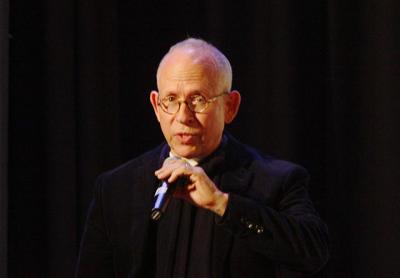Balaban: What It's Like Not Being Bening

“A lot of movie stars are movie stars because they basically play themselves all the time,” Bob Balaban said to Annette Bening during their discussion at the East Hampton Middle School as part of the Hamptons International Film Festival’s A Conversation With . . . series. “To me, the more I’ve watched you, the more I’ve been amazed at how you become other people . . . which I find wonderful and also amazing in somebody who is a ‘star.’ ”
The highlight reel that preceded the conversation offered especially dramatic proof of that.
Ms. Bening was in town for the East Coast premiere of “Film Stars Don’t Die in Liverpool,” a narrative feature based on the British actor Peter Turner’s memoir of his relationship with Gloria Grahame, the older American actress often cast as a femme fatale in film noir movies.
“I had studied Gloria when I did ‘The Grifters,’ ” said Ms. Bening, referring to the 1990 neo-noir crime drama, “but there wasn’t much reliable information about her. We all used Peter’s book and his point of view as inspiration for what we were doing. He is a beautiful man, and we all kept going back to talk to him about his experience. The film is a very close-up picture of a relationship. There’s something very universal about it.”
Ms. Bening came to movies relatively late. Raised in San Diego, she attended community college for two years before earning a theater degree from San Francisco State University. She then joined the American Conservatory Theater and worked as a community theater actress for many years.
She moved to New York City when she was 28 and soon landed a role in Tina Howe’s play “Coastal Disturbances,” which earned her a Tony Award nomination. “I think it was helpful that I didn’t move to New York when I was a ‘baby,’ and I didn’t start to do movies until I was almost 30. That helps in a way to deal with the phenomenon of becoming known.”
“I was lucky for having done ‘Coastal Disturbances.’ We did it for almost a year, and that’s when you really learn about yourself as an actor. It’s one thing to do it for a short run, or a film where you’re doing a scene for maybe two days and then you’re done with the scene. With a play, you have to find a new way to approach it every time.”
She cited as one her most important influences Milos Forman, the Czech-born director who cast her in “Valmont,” which was based on the epistolary novel “Les Liaisons Dangereuses.” “Milos taught me a lot about acting. He was tough, and he was right. A lot of American directors are much more nurturing and sensitive and build you up. Milos would say, ‘That’s not natural,’ and he was right.”
Among the other directors she discussed having worked with were Stephen Frears and, at some length, Mike Nichols. “I worked for Mike on ‘Regarding Henry’ with Harrison Ford in 1991. I was playing Harrison’s wife and I was so nervous, as I was just starting in movies. And I remember both of them saying how nervous they were on the first day, and I thought, ‘You’re nervous? But you’re Mike Nichols!’ ”
“That was a great lesson, and one I try to pass on as often as I can, especially to acting students. Every time somebody puts a camera in your face, it’s a natural human response to become self-conscious.”
The discussion turned to rehearsal. “Some people like it, and some don’t,” she said. “At the beginning I thought, what do I know? I’ve never done movies. I did a film with Robert De Niro early on. He didn’t want to rehearse,” and she wasn’t about to argue with him.
Sydney Pollock hated rehearsal, according to Mr. Balaban, who worked with the director in “Absence of Malice.” “If he saw us going over a scene beforehand, he would say, ‘What do you want to do, be perfect? Make a mistake on film, it’s much more interesting.’ ” “If I had my druthers,” said Ms. Bening, “I would rather rehearse. But I just did a film where we didn’t rehearse at all. We didn’t even discuss it. It’s scary. You show up, and suddenly you’re my husband or you’re my mother or I’m your mother. It’s intimidating, but I’ve learned to get used to suddenly being there and there’s a crew and they say, ‘Action,’ and it’s my turn.”
“For me rehearsal doesn’t just mean sitting and trying to do it the way you’re going to do it. It’s about getting to know the other people. It bonds people, you become a family, you become a unit. With many films, especially independent films, there’s no time to rehearse, they can’t afford it.”
Asked by a member of the packed audience how she picks projects, she said, “Because I have four kids, it’s often when is it shooting and where. ‘Being Julia’ was shot in Hungary and London during the summer, so I was able to bring my kids.”
